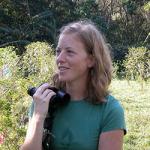
Valerie Peters, Ph.D.
Dr. Valerie Peters (She, Her, Hers) is working in tropical forests and coastal communities in Costa Rica to study pollinator populations and the services they provide to help protect them from the effects of climate change and habitat loss.
What inspired your interest in pollinators?
Animal pollinators are in decline worldwide due to pesticide use and habitat loss and degradation. Pollinator communities may be further affected by a changing climate. The ecosystem service that pollinators provide to humanity is critical to our future food security and the ecological health of the planet because not only is crop yield influenced by pollination but it is also estimated that over 98% of plant species in tropical lowland forests are animal pollinated. I am interested in exploring the relationship between pollinator communities and pollination services so that we can better understand how to best protect and manage landscapes for this important ecosystem service.
Not only that, I think bees are beautiful. The first time I ever looked at a bee under a microscope it was amazing. Worldwide there are 20,000 described species and the diversity of patterns and colors among these species is remarkable. There are just as many colors and sizes and shapes of bees as birds but we don’t know that because we can’t see them.
How does citizen science support your research?
There is a lot of work that needs to be done to understand how pollinators and pollination services are connected. Citizen scientists can help monitor pollinator populations over time as the environment and the climate change by collecting and photographing pollinators. The research requires many eyes in the field at sampling locations across different altitudes to collect enough long term data to understand if pollinators are moving upwards in response to warming temperatures and reduced cloud cover. Pollinator and pollination services recovery can also be monitored by citizen scientists in restoration plots of pollinator friendly agroforests to test this strategy for restoring pollination services. Citizen scientists can also play a critical role in helping to plant and maintain the plant species that will be used to test the restoration strategy.
What is your favorite moment in the field?
I was collecting bees in January of 2014 with some students from a Miami University field course, along the elevational transects in San Luis de Monteverde. As is typical of January in the Pacific Northwest of Costa Rica, the weather was calm, dry and warm as we started out at the lower elevation sites. It was hot enough for just a t-shirt with light winds, but by the time we climbed the mountain and reached 1100 meters, the vertical mist was piercing, with winds howling and gusts up to 100 kph! The students were exhilarated by the strong winds and the breathtaking views of the valley and the Gulf of Nicoya below. It was great to watch their excitement as we climbed up and down the mountainside collecting bees and enjoying the spectacular day, the intense weather, and the unforgettable scenery.
Education
- Ph.D. in Ecology, Odum School of Ecology, University of Georgia, GA (U.S.)
- B.S. in Biology/Ecology, Pennsylvania State University, PA (U.S.)
